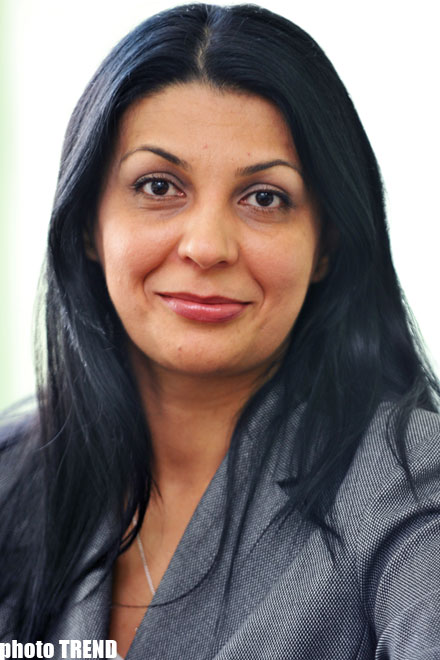Saba Agayeva, Deputy Director of Trend agency
Foreign policy of Azerbaijan has not undergone serious changes over the past five years. Official Baku pursued balanced policy based on the principle of equidistance from the power centers of the world - Moscow, Washington and Brussels. This political line, the foundation of which was laid by the national leader Heydar Aliyev, did not undergone changes even at hardest times - during Georgian-Russian conflict.
However, the nature of the foreign policy has changed. From 2003 to 2008, Azerbaijan acted much more confidently in the international arena due to the economic development. Azerbaijan saw rapid economic development for the short period of time. In particular, from 2003 to 2008 Azerbaijan's GDP grew by 2.7% to $5,800 per capita. The budget amounted to $15bln in 2008 while budget expenditure amounted to $1.2bln in 2003. So, $44bln was invested in the economy of the country from 2003 to 2008.
This is a huge sum directed at the development which also provides economic basis to carry out independent international policy. Thanks to the economic growth and efficient foreign policy, Azerbaijan became leader in the region. Financial opportunities enabled Azerbaijan to sanction a project on construction of Baku-Kars Akhalkalaki railway. The commencement of the project in condition of the US countermeasures testified that Baku is strong enough to implement large scale regional projects.
From 2003 to 2008, Azerbaijan continued its oil policy founded by national leader Heydar Aliyev in 1994. However, this policy went through certain modernization in order to keep pace with the demands of the developing economy. So, increase in oil production from 15.4mln tons in 2003 to 52mln tons in 2008 enabled State Oil Company of Azerbaijan (SOCAR) to pursue more active foreign policy, to open filling stations in Georgia, to buy Kulevi oil terminal and Turkey's Petkim petrochemical complex and to supply gas to Georgia. Of course, all the above-mentioned activities bring political dividends as well. For instance, a real war is waged for the Azerbaijani gas. West wants Azerbaijan to take part in Nabucco and Russian Gazprom offers to purchase Azerbaijani "blue fuel".
However, Azerbaijan evidently says that it will give preference to those who will contribute to the resolution of the Nagorno-Karabakh conflict to a greater degree. At the same time, from 2003 to 2008, Azerbaijan transported its carbohydrate reserves via the Baku-Tbilisi-Ceyhan and Baku-Tbilisi-Erzurum routes. The Georgian-Russian conflict affected operation of these pipelines, but the energy diversification of Azerbaijan could withstand this crisis. The oil transportation continued through the Baku-Novorossiysk pipeline even at the height of the crisis. But, as a whole, the situation revealed that there are some problems in the energy diversification of the country which can be solved by expanding export opportunities in the "north" direction.
The economic development left a trace on the issue of Nagorno-Karabakh which is of vital importance for Azerbaijan. From 2003 to 2008, the national army has strengthened considerably. The budget expenditure for military purposes totaled $1.850bln as compared to $163mln in 2003. In other words, in 2008 military assignments of Azerbaijan's budget almost equaled to the public budget of Armenia. Azerbaijan takes advantage of this factor in a proper way and announces that it will not further stand breach of its territorial integrity and is prepared to liberate its occupied lands by any means.
Unfortunately, the key objective of Azerbaijan's foreign policy, which is aimed at resolving the Nagorno-Karabakh conflict through peace negotiations, has not been achieved yet. Of course, there was certain progress in this direction - UN resolution on territorial integrity of Azerbaijan, super powers' support to territorial integrity of Azerbaijan, Russian-Azerbaijani political declaration which backs Azerbaijan's position in the Nagorno-Karabakh conflict, etc. During the Georgian-Russian conflict Moscow, Washington and the EU reiterated their support to the territorial integrity of Azerbaijan. Meanwhile. President Ilham Aliyev stated that favorable conditions had been created to resolve the Nagorno-Karabakh problem. The main point is that the world now understands the conflict can be settled only within the frame of territorial integrity of Azerbaijan.
President Ilham Aliyev said at a meeting of the Cabinet of Ministers on 13 October that the mechanism to withdraw troops from seven Armenian-occupied regions of Azerbaijan and repatriation of refuges and internally displaced persons have been coordinated by the sides of the conflict. The repatriation of the Azerbaijani refugees to Nagorno-Karabakh is under discussion and will also be solved sooner or later, the President said. Baku also says that economic cooperation between Azerbaijan and Armenia is impossible until the dispute over Nagorno-Karabakh is solved. Thus, Yerevan cannot participate in any regional economic project.
Azerbaijan will continue its policy of pressuring on Armenia in the diplomatic, political, economic, transport and military spheres until the conflict is resolved.
The correspondent can be contacted at - [email protected]






